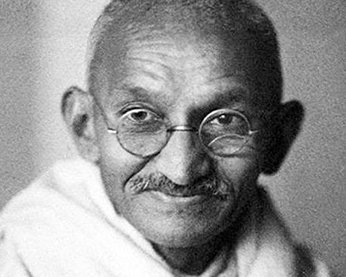If Even Saints are Smeared by the Media, Can We Believe What We Read?
I just read an article disparaging Scientology, written by a food writer, of all things. She had brunch at a French restaurant, the Renaissance, inside Scientology Celebrity Centre in Los Angeles. I have eaten there from time to time, and love the place, so I was interested in what she had to say.

Instead of focusing on the food and the ambiance—what she saw with her own eyes, heard with her own ears, and tasted with her own sharp little tongue—she larded all her direct observations with indirect attacks she had read or seen in the media from people with an ax to grind, who were long ago kicked out of the church for good reason. So her article was just a pretext to showcase all the nasty innuendo bigots have forwarded about my church, and any direct observations came with a twist of the steak knife.
Then I had an idea. I could write an article for my personal blog in a similar style about some unimpeachable person or institution that was universally admired. Someone like Mother Teresa, Mahatma Gandhi, George Washington, or Little League Baseball. I’d do it in the same kind of smarmy style the food writer used to write about my church, only I’d do it ironically about someone or something so universally respected and admired that the foolishness of it would be clearly exposed.
I began looking on the Internet for my iconic person or institution. I searched for Little League Baseball. To my surprise I found the following headlines: “Good Riddance to Little League” (Slate); “Little League World Series Embodies Worst in Youth Sports” (Poughkeepsie Journal); “Why I Hate the Little League World Series” (Forbes). OK, so somebody beat me to it—only for real, not ironically (wasn’t expecting that). So I had to look elsewhere.

Surely Mother Teresa, who received the Nobel Prize in 1979 and was made a saint in 2016 would be a perfect candidate. To my chagrin, here were the headlines that turned up on my search: “Mother Teresa’s Sainthood Is a Fraud, Just like She Was” (Medium); “Mother Teresa Wasn’t a Saintly Person, She was a Shrewd Operator” (UK Independent). A video, accusing her of stealing from the poor and making them suffer while she pocketed millions of dollars uses a doctored photo of her with glowing red eyes. So Mother Teresa, of all people, has been demonized—literally.
Wow, I’m starting to feel a bit apathetic here. Maybe this isn’t a good idea after all. But I picked my face up out of the bouillabaisse, wiped my brow with a napkin and soldiered on. Who else should I try?

How about Gandhi, who took on the British Empire not with guns and bullets, but with nonviolence? He is now considered one of the 20th century’s most important figures and revered as the father of India. How could I fail if I used him as my icon of humanity? Headlines: “Gandhi, a Wily Operator, Not India’s Smiling Saint” (UK Telegraph); “Was Gandhi a Racist?” (BBC); “The Truth about Gandhi’s Sex Life” (UK Independent). Well, here’s another icon, revered around the world, attacked by the media. But those are UK publications. Maybe it’s understandable since Gandhi took India away from them. Perhaps they have an agenda.
OK, so on to George Washington, the Father of his Country. I figured King George III would be unhappy with him (something about the United States was founded on the “criminal enterprise” of rebellion). But even CBS News promoted that our first president got rich on moonshine and singlehandedly started the French and Indian War.
I began to see a pattern in all this. The intent is, in some cases, to clarify the record and bring scholarship to bear on a historical figure (I’m being charitable here). But in others—I’m thinking about Mother Teresa’s glowing red eyes—it’s to demonize someone or something admired by most people, to slime them. There is an agenda at work behind most media today. So nobody is safe from the tabloids, the Internet blogs, the trolls or just mean-spiritedness. And religions seem to be a particularly easy target. Everyone has an opinion and a slew of “facts” to back it up.
Unfortunately, conflict, corruption and sleaze are big clickbait items—the top of the list on how to grab attention, market share, exposure and a higher ranking on Google search, among billions of pieces of information on the Internet. It’s the media version of an auto wreck—everyone wants to have a look, the messier the better. The lowest common denominator in information pimping.
OK, so if the intrepid searcher for dirt—it’s called “opposition research” in politics—can find hateful negativity on the saints and heroes of mankind, then how can anyone expect to be treated fairly?
It is quite revealing to read a news report on some controversial issue or person and then go to the source in the form of a video or transcript of what was actually said and compare the two accounts. Most times the writer has slanted his or her account in the direction of more controversy, more injustice and less rationality, because more controversy gets more traffic, more traffic sells more ads, and more ad revenue is the lifeblood of news outlets that now compete globally for readers and viewers.
And aside from the sleaze-conflict-and-gossip mentality of such coverage, there’s the matter of agenda. When Frederick Remington arrived in Cuba in 1897 to cover hostilities between the U.S. and Spanish authorities, he found nothing and cabled back to the New York Journal’s William Randolph Hearst that there was no war and he wanted to come home. Hearst supposedly cabled back: “You furnish the pictures, I’ll furnish the war.” While media may not be so blatantly biased today, it is most certainly split along political lines and clamoring to grab attention.
So my suggestion is, when looking for information on anything controversial, check out the religion or political party, individual or organization’s homepage first. Get the data directly from the source, not from a detractor.
The problem with telling people to go to the source to “look don’t listen” is those who have an ax to grind may have gotten to them first and will have warned against looking directly. Why not look yourself? you might tell someone. Well, a favorite reason forwarded is “brainwashing”: one look and who knows what could happen? I once spent a weekend with members of the Unification Church at a retreat and according to all the news items I’d read about them, I should have been “brainwashed” and ended up joining them. But when I looked at the group, talked to members and listened to what they had to say, all that fell away. They were committed to their religion, they worked hard to spread the word, and because of frequent attacks in the media, were they harassed constantly. I didn’t join them, but I admired their dedication and determination in the face of that media-created hostility.
So my suggestion is, when looking for information on anything controversial, check out the religion or political party, individual or organization’s homepage first. Get the data directly from the source, not from a detractor. Go and investigate yourself, rather than swallow some food writer’s opinion (and take that opinion, when you read it, with a grain of salt).
For Scientology, check out our TV channel at Scientology.tv. The Scientology home page is Scientology.org and a good source of information. You can even take a free online course. If what you find isn’t up your alley, that’s cool, at least you looked for yourself. If you’ve heard rumors about us, check out Standleague.org for the actual data about who’s spreading those rumors and why. At least then you’ll have your own opinions based on what you’ve seen and heard. You didn’t swallow someone else’s clickbait opinion you found rolling around on the Internet.
King George III would be a terrible source of information about the American Revolution. The BBC has a jaundiced view of Gandhi. High Times might not be very charitable to those trying to halt the legalization of marijuana and detractors might find it useful to plant false stories that inflame U.S. political animosity and racial tensions. In the globalization of information, the responsibility for tracking down the truth is squarely in your hands.










